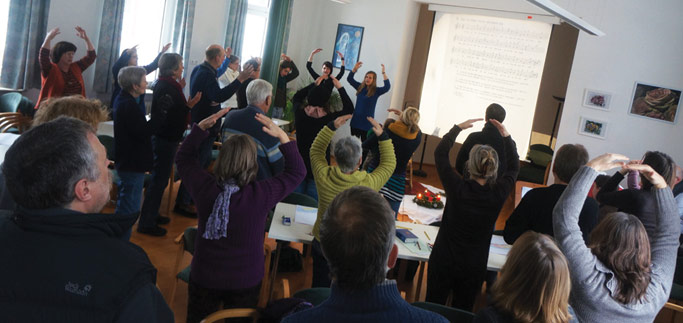By David Stutzman
Mennonite means different things to different people in Germany. Sect. Heritage. Irrelevant. Faithful. Traditional. Since arriving, we have been in a process of learning what the label means to those who are from a Mennonite background, those who were, those who are not, and those who have nothing to do with Christianity.
Part of what we do is spend time getting to know young people in their 20s and 30s, who grew up Mennonite, but have moved away from their home community to study or work in other parts of the country, especially in larger cities. We are interested in learning about what church means to them and how they go about living out their faith. We have discovered that they are often active in churches, new church plants, or providing leadership to new initiatives. We have been very impressed.

Worship service at the church in Bammental, Germany, where David and Rebekka Stutzman serve. Photo courtesy of author
We have also been learning about what Mennonite means to them. For some, Mennonite is something that they have left behind or fail to see its relevance beyond the traditional communities they grew up in. Others regard their Mennonite church experience as positive, appreciating the values as something that they have taken with them. We feel like our work is an exercise in understanding how the Mennonite label translates for today’s context, which has drastically changed over the past few decades. Indeed, among these young people, Mennonite is something people associate with small rural churches, strong familial ties, and aging membership, not necessarily young, urban, and into church planting.
We find ourselves in a challenging and yet exciting niche, one that means we get to explore what it means to do mission in Western culture and what meaning Mennonite and Anabaptism have for today. We have learned that it is essential that the purpose and identity of the church finds inspiration in the Kingdom of God and invites folks to participate in something that goes beyond the preservation of a denomination. Translating ‘Mennonite’ for today means balancing the things associated with Mennonite, like the values and heritage, while not making it be about being Mennonite, like focusing on a vision for church that seeks to disciple faithful followers of Jesus Christ in the places we are located.

Rebekka Stutzman meets over coffee with friends. Photo courtesy of author
